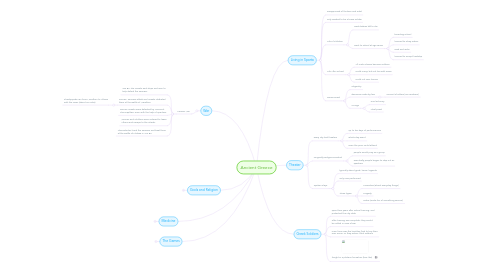
1. Medicine
1.1. people would go to the temples and pray to Asclepius (god of healing)
1.2. treatments included: bathing, fasting, rest)
1.3. Hippocrates
1.3.1. father of modern medicine
1.3.2. developed practice of examining patients
1.3.3. Hippocratic Oath
1.4. Herophilus
1.4.1. taught doctors about surgery
1.4.2. herbalism as a source of medicine
2. Gods and Religion
2.1. Gods
2.1.1. Many different beliefs
2.1.1.1. some gods were like humans
2.1.1.2. Protagoras believed no gods
2.1.1.3. Xenophanes believed in one God
2.1.2. Myths
2.1.2.1. Children taught at young age
2.1.2.2. 12 most important lived on Mt. Olympus
2.2. Temples and Shrines
2.2.1. People often prayed to gods
2.2.2. temples all over Greece
2.2.2.1. each temple had a priest
2.2.2.2. didn't pray inside temples
2.2.2.3. animal offerings were common
2.2.2.4. used oracles for advice
3. The Games
3.1. began as a way to honor gods
3.2. types of competition
3.2.1. running
3.2.2. jumping
3.2.3. wrestling
3.2.4. discus and javelin
3.2.5. riding
3.2.6. charriot racing
3.3. Many different festivals to honor gods
3.3.1. Poseidon
3.3.2. Apollo
3.3.3. Zeus
3.3.3.1. Most famous were the Olympic Games
3.4. Olympic Games
3.4.1. banned by the Christians in 394 AD, b/c the honored Greek Gods
3.4.2. returned in 1896
3.4.3. took place every 4 years during June or July
3.4.4. not professional athletes
3.4.5. winners received an olive leaf garlands
4. War
4.1. Persian War
4.1.1. 499 BC The Greeks sent ships and men to help defeat the Persians
4.1.2. 490 BC, Persians attack and Greeks defeated them at the Battle of Marathon
4.1.2.1. Pheidippides ran from Marathon to Athens with the news (about 25 miles)
4.1.3. 480 BC Greeks were defeated by Xerxes at Thermaphlae, even with the help of Spartans
4.1.4. Women and Children were ordered to leave Athens and escape to the islands
4.1.5. Themistocles lured the Persians and beat them at the Battle of Plataea in 479 BC
5. Living in Sparta
5.1. Disapproved of thinkers and artist
5.2. only needed to be a brave soldier
5.3. Life of Children
5.3.1. weak babies left to die
5.3.2. went to school at age seven
5.3.2.1. boarding school
5.3.2.2. learned to obey orders
5.3.2.3. read and write
5.3.2.4. learned to accept hardship
5.4. Life After School
5.4.1. All male citizens became soldiers
5.4.2. could marry, but not live with wives
5.4.3. could not own homes
5.5. Government
5.5.1. Oligarchy
5.5.2. decisions made by few
5.5.2.1. Council of Elders (28 members)
5.5.3. 2 Kings
5.5.3.1. one led army
5.5.3.2. chief priest
6. Theater
6.1. every city had theaters
6.1.1. up to ten days of performances
6.1.2. whole day event
6.1.3. even the poor could attend
6.2. Originally Religious Festival
6.2.1. people would pray as a group
6.2.2. eventually people began to step out as speakers
6.3. Spoken Plays
6.3.1. typically about gods, heros, legends
6.3.2. only men performed
6.3.3. Three types
6.3.3.1. Comedies (about everyday things)
6.3.3.2. Tragedy
6.3.3.3. Satire (made fun of something serious)
